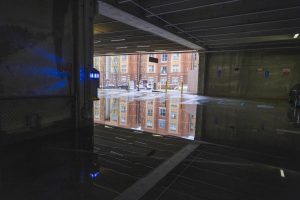Working through COVID-19: Faculty, students react to burnout
November 17, 2020
Burnout is nothing new for college students, but this semester it is amplified by a global pandemic, economic deterioration, rising social tension and a new online format for learning. These challenges, with no breaks in the semester, left students anxious and exhausted and everyone is facing challenges they wouldn’t have been able to wrap their minds around previously.
One of Jennifer Redifer’s main areas of study is cognitive load, which she said can help explain the lack of motivation many students are experiencing. Redifer is an associate professor of psychology who holds a doctorate in educational psychology.
Cognitive load, Redifer explained, is the mental resources you use to perform tasks. Extraneous cognitive load is any– thing not directly related to the task at hand that distracts you.
“So, with this semester being what it is, having additional demands of doing work in a weird online format and not having as set of a schedule, that can feel like an extraneous cognitive load and it can make completing tasks more difficult than a normal semester.” Redifer said.
Redifer said it may not be that the assignments or workload are harder than or different from a normal semester, but the new circumstances surrounding that workload can make them feel harder, and it can especially make starting the task harder.
Darbi Haynes-Lawrence, a professor and the director of the child studies program, said she factored in this decreased motivation of students into her planning for the semester because if students are stressed to the point of distress, they won’t learn.
“I spent the summer looking at the content of my classes, and I looked at how can I meet the needs that are outlined in the curriculum and our course objectives while also being fair to the students and their mental health needs,” Haynes-Lawrence said. “I watched my colleagues, my child and her friends and my students in summer school, and I watched how their mental health shifted because of the pandemic, and it was atrocious.”
Haynes-Lawrence said she went into the semester already with an alteration of content to eliminate busy work, but she said she knew at the halfway point that she needed to reassess, so she implemented a survey to gauge where her students were at.
Haynes-Lawrence altered the last half of the course based on the results of the survey, but she made sure the students were still meeting course objectives by shifting how they were learning and ex- pressing to her what they know.
Haynes-Lawrence said a survey in one class showed that the students were stressed but felt the rest of the semester was doable, so there was no need to alter anything, but in a different class, she removed the final writing project.
Because she does not believe in testing, her courses are heavy in writing. After assessing how great her students performed on the midterm, she made the final project in one class a bonus opportunity.
“My courses are heavy in writing and in one course, my students did so beautifully on the midterm writing assignment, so the final writing project would just create a burden, something for them to look at and just stress about,” Haynes-Lawrence said.
Haynes-Lawrence said the students already demonstrated they understood the concepts they needed to, and as long as her students reached the course objectives, she didn’t feel the need to overburden them.
Sheila Flener, instructor and program coordinator for the Interior Design program, took a similar approach when planning for the semester.
“You gotta have compassion and understand that you don’t know what these students are going through, and we have an organization, the Interior Design Association, where we have students who get on our Zoom meetings just because they need someone to talk to,” Flener said.
Flenner said she also altered her course throughout the semester depending on feedback she received from students.
“I know some of them feel hounded on with the amount of work given to them in other classes, so I take that into consideration,” Flener said.
Flener had three projects planned for the semester but after seeing her students needed more time to focus on them, she canceled one and still felt the students were meeting the objective of the course.
Flenner said in a typical semester she has very strict deadlines, but she has removed that expectation for now.
“I stopped that for right now be- cause I saw where students were getting stressed or burnt out and apologizing for being late,” Flener said. “I understand that. I was very worried about them, so I’ve been more flexible than I usually am. I’ll go back to my strict standard when this is over, but I am having a hard enough time, so I can’t imagine how the students feel.”
Redifer also said to focus on what you can control, like your schedule.
She suggested spreading out deadlines through the week instead of leaving everything until the end of the week. Redifer said this will help to not feel as overwhelmed, and accomplishing each thing will give you more motivation to feel like you can do the next thing.
Amanda Maceyko, a senior middle school math education major, said she has less motivation this year than ever before, which has affected the way she thinks she is performing in her classes.
“I am normally a good student, but this semester I am struggling to get everything in on time or produce quality work,” Maceyko said. “I’ve noticed the stuff I’ve turned in is just not my best work. I’m not performing to the best of my ability or close to it, and it’s because I feel burnt out and I have no motivation.”
Maceyko thinks part of the reason for this is because her classes are completely online, so with social distancing guidelines already in place, she feels even more isolated.
“I think not having any in-person classes affects me so much because I just sit at home and don’t interact with people,” Maceyko said. “I just have a to-do list and I don’t feel like I am experiencing school. It just feels like I’m alone in every single class.”
Maceyko said she thinks the education department is amazing all around and that her professors have been very understanding and want her to succeed, but she doesn’t feel the same connection she generally would with her professors because of the new online format.
Maceyko said she is the typical teach- er’s pet and loves talking to her professors before and after class.
“I don’t have that connection any- more, which brought me motivation be- cause I was excited to do well for them,” Maceyko said. “Now I’m just turning stuff in online and I don’t care as much because I feel like I’m just putting stuff online, not turning it into a person.”
Maceyko said another thing that factors into her burnout this semester is the anxiety she has felt.
“My anxiety is through the roof this semester,” Maceyko said. “I sit there and look at my work and just start crying most of the time. I try so hard to make a to-do list every single day and I don’t do it. I wait until the last minute and scramble something together, and then I start crying about it after because it’s not my best work.”
Noah Moore, a senior Public Relations, Arabic and Spanish major, said this is the least motivated he has been throughout his time at WKU.
“The past three years I felt very motivated to get my assignments done on time but with the pandemic, I feel like nothing matters as much as I thought it did,” Moore said. “Things I put a lot of importance on have either fallen apart or haven’t happened, which is really discouraging to students.”
Moore said it is especially difficult for him because he is a senior about to graduate and enter the job market during the era of COVID-19.
“There’s a lot of unknown; as a senior, I’m entering the job market, and I don’t know if there’s gonna be jobs,” Moore said.“I study modern languages, and we can’t even leave the country. Right now, I think my lack of motivation is partly because there’s no prospect of being able to go abroad or use what I’ve been working for four or eight years towards.”
Moore said he thinks that it goes beyond just work or school at this point.
“At work, I was told that people are noticing I’m not as positive anymore and it’s so hard to reckon with that too,” Moore said. “Not just school, not just work, but thinking we’re all probably gonna be changed by this pandemic.” “When you have all these opportunities lined up and they all get canceled, how can I not be pessimistic? There’s a big cloud of negativity and pessimism, which isn’t anyone’s fault but it’s just looming.”
Like many professors at WKU, Moore said his professors have done a great job navigating their students’ needs, which he thinks is what will help get everyone through the semester.
“I think my professors have done amazing to ease our stress,” Moore said. “If I miss a deadline, they’re su- per understanding. I think that is what will get us through this, recognizing our shortcomings and being like you know what, that’s okay, this is unprecedented, and no one could have prepared for it and it’s okay if we’re slacking a little be- cause we’re all facing this.”
Tess Welch, a junior studying special education and sign language, is a 4.0 student but fears this might be the first semester where that is unattainable for her.
“It’s hard to be a student in the era of COVID-19, especially as a people person, to continue in the same level of intensity that I would normally bring to academics and extracurriculars,” Welch said. “I feel a lack of community.”
Welch thinks the burnout students are experiencing right now is different for each person, but for her it largely stems from feeling isolated.
“I am in a category of people who have to be more careful,” Welch said. “I wear a mask at all times, even outside or six feet apart, I only unmask around two people. I live alone, so it has felt extremely isolating. It’s hard to find motivation when you feel alone.”
Welch said there are other social and economic factors that play into her burnout as well, which she suspects many other students struggle with.
“Many students have lost their jobs, or their parents have; the economy’s decline weighs on students,” Welch said. “At one point this summer and at the beginning of the semester, I was the only one employed in my immediate family, and I come from a family where my mom and dad have always worked, so that weighed on me and it was incredibly difficult.”
Welch is the College of Education and Behavioral Sciences senator and the committee chair for the academic student affairs committee on SGA, and she has been advocating for the university to go Pass/D/Fail this semester.
Welch feels that a Pass/D/Fail option is a necessary safeguard to ensure that the burdens students are facing is not increased by anxiety about how this semester’s GPA could permanently impact them.
“Student’s mental health is all over the place right now. We had a historic election, monumental civil rights movement and a global pandemic.” Welch said. “The combination of all these things requires that the university prioritize the student’s well-being by giving pass/fail so students don’t have to sacrifice their mental health for a grade.”
Welch feels strongly that this semester is more challenging than last semester and should not be treated differently by the university.
Welch said one reason the spring was less challenging was because teacher expectations were lower in the spring and they were more understanding.
“Also, we were sent home, so in our minds, we were like okay this is differ- ent.” Welch said. “But now we are on campus, and it looks like the same cam- pus, but you’re not able to do normal social things, or go out with friends, or do things you normally would on campus. This is a difficult reality check many students have had difficulty wrapping their minds around.”
Welch said in the spring, it seemed like there might be some end in sight, but now the burden of how long this will last is really weighing on her and other students.
“There was some hope earlier this year, but now Kentucky continues to have record breaking days in COVID-19 cases and deaths,” Welch said. “It’s wrecking so many families and students shouldn’t have to go through this loss alone, but you’re forced to because of the pandemic.”
Welch said she just wishes the university would understand that the reality of the demands students are facing and that the expectations are higher when a student’s ability to follow through is lower.
“So, right now assuming things are fine and implementing a normal grad– ing scale glosses over the realities of students in search of some utopian place we live in, but the reality is we are living in dystopian times and student’s struggles are real.” Welch said.
Maggie Thornton can be reached at margaret.thornton882@topper.wku.edu.















